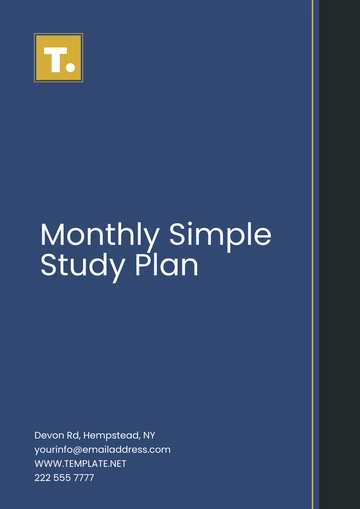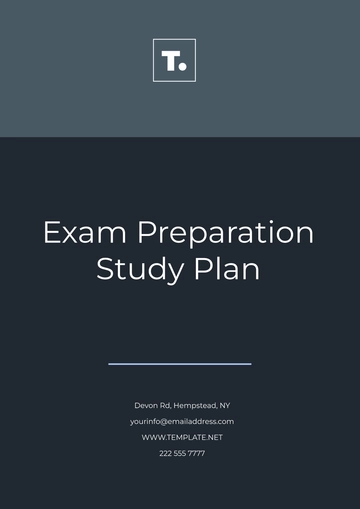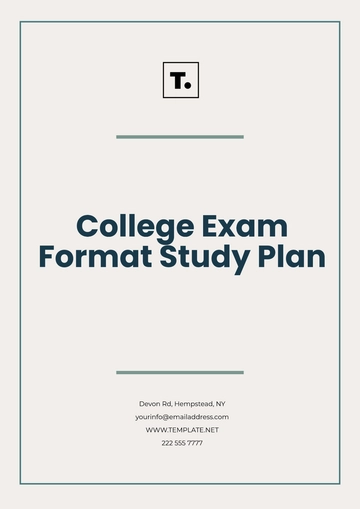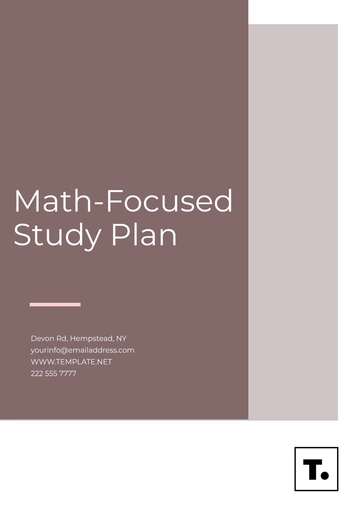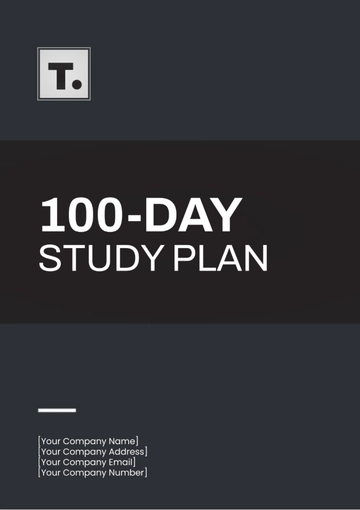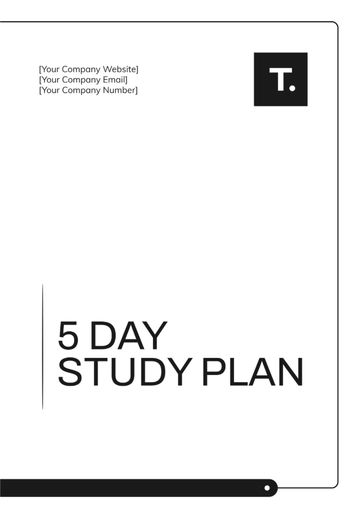Free Personal Study Plan

Prepared by: [Your Name]
I. Goals and Objectives
A. Academic Goals:
Achieve a minimum grade of B+ in all subjects this semester: Focus on understanding the core concepts of each subject by allocating specific study time for difficult topics. Attend all lectures and actively participate to clarify doubts.
Complete all assignments on time and with a focus on high-quality work: Set aside dedicated time for each assignment, allowing for research, writing, and revision. Aim for clarity and accuracy in presenting arguments or solutions.
Improve exam performance: Aim for a score of at least 85% on each exam by practicing past papers and participating in group study sessions. Use active recall and spaced repetition to boost the retention of critical information.
B. Personal Development Goals:
Improve time management skills by reducing procrastination: Use techniques like the Pomodoro Method (25 minutes of focused work followed by a 5-minute break) to break down tasks into manageable chunks. Set specific, measurable goals for each study session.
Build confidence in presenting and participating in class discussions: Prepare for presentations by rehearsing in front of a mirror or with a study buddy. Actively engage in class by asking questions and contributing to discussions, even if it's only a small comment at first.
II. Study Schedule
A. Weekly Schedule:
Monday to Friday: Study from 8 AM to 12 PM, focusing on core subjects:
Monday: Mathematics (Algebra and Geometry)
Tuesday: History (Modern European History)
Wednesday: English Literature (Shakespeare’s plays)
Thursday: Science (Physics – Mechanics)
Friday: Review of all subjects studied during the week.
Monday, Wednesday, Friday: Review lecture notes and complete practice exercises from 2 PM to 4 PM:
Monday: Review notes from Mathematics class and complete practice problems on algebra.
Wednesday: Review the lecture on Shakespeare’s plays and summarize key themes.
Friday: Practice quizzes for all subjects to assess understanding.
Saturday: Study for upcoming exams or work on projects from 9 AM to 1 PM:
Saturday morning is dedicated to exam preparation, especially in subjects with upcoming tests. Work on group projects and discuss assignments with peers if needed.
Sunday: Rest day or review any missed content:
Use Sunday as a day to relax and recharge, but also to review any content you may have missed or feel unsure about during the week.
B. Daily Study Blocks:
8 AM - 10 AM: Subject 1 (e.g., Mathematics):
Focus on solving problems, reviewing formulas, and understanding concepts. Allocate time to revisit complex areas like calculus or trigonometry.
10 AM - 12 PM: Subject 2 (e.g., History):
Break down historical periods into key events and figures. Review maps and timelines to understand geopolitical shifts.
2 PM - 4 PM: Subject 3 (e.g., English Literature):
Read and analyze chapters or plays. Focus on identifying literary devices, themes, and character development. Use highlighters for key quotes and make notes in the margins.
III. Resources
A. Books and Textbooks:
"Advanced Mathematics for Beginners" (Chapters 3 and 4): Focus on chapters covering algebraic equations and geometric proofs. Spend extra time on topics like trigonometry and statistics.
"History of the Modern World" (Sections 2.1 to 2.3): Focus on the Industrial Revolution and its impact on society. Create a mind map of key causes and effects.
"Shakespeare’s Complete Works" – Annotate important passages from plays like "Hamlet" and "Macbeth." Research historical context and explore different interpretations of themes.
B. Online Resources:
Khan Academy: For mathematics tutorials, especially on calculus and probability, watch videos and complete the exercises at the end of each topic.
Coursera: Take supplementary history courses on modern world history and its impact on current global affairs.
Quizlet: Use Quizlet flashcards for quick memorization of historical facts, scientific formulas, and vocabulary for English literature.
C. Tools and Software:
Google Calendar: Schedule all study sessions, assignment deadlines, and exam dates. Set reminders for review sessions and take note of any important academic deadlines.
Evernote: Use Evernote for note-taking during lectures and while reading textbooks. Organize notes into notebooks by subject for easy reference.
Forest App: A productivity tool that helps you stay focused by growing a virtual tree during your study sessions. Helps reduce distractions from social media and mobile apps.
IV. Assessment Methods
A. Weekly Quizzes:
Complete quizzes at the end of each week for each subject to assess comprehension. Use these quizzes to identify weak areas that need more focus.
After completing quizzes, analyze your results to understand why you made mistakes and take note of which areas require further practice.
B. Midterm Exam:
Preparation Plan: Two weeks before the midterm, create a revision timetable. Review key concepts each day, focusing on one subject per day. Practice with past exam papers and create a list of potential exam questions to answer.
Schedule mock exams to simulate real test conditions and improve time management during the actual exam.
C. Assignments:
Preparation: Start working on assignments as soon as they are assigned, breaking them into smaller tasks. Set deadlines for each part (research, outline, writing, editing).
Review feedback from previous assignments and apply suggestions for improvement in the next one. Always aim to submit your work at least one day before the actual deadline to avoid last-minute stress.
V. Review and Reflection
A. Weekly Reflection:
Every Sunday evening, spend 20 minutes reviewing your progress from the past week. Reflect on your achievements, such as completing assignments on time, and identify any areas where you struggled.
If any task or subject was more challenging, think of ways to approach it differently the following week. You might need to adjust your study times or ask for help in specific areas.
For example, if you feel overwhelmed by the amount of reading, consider breaking your reading into shorter, more manageable sections.
B. Monthly Review:
At the end of each month, assess your overall progress and identify patterns in your study habits. Are you consistently meeting your goals? Are there any specific subjects that you need to devote more time to?
Adjust your study plan based on feedback from exams, assignments, or personal experience. Celebrate milestones like completing a difficult project or scoring well on an exam, and set new goals for the next month.
Reevaluate your long-term goals, such as your desired grades or academic achievements, and set new challenges or rewards for the upcoming month.
- 100% Customizable, free editor
- Access 1 Million+ Templates, photo’s & graphics
- Download or share as a template
- Click and replace photos, graphics, text, backgrounds
- Resize, crop, AI write & more
- Access advanced editor
The Personal Study Plan Template from Template.net is your ultimate study companion. Fully editable and customizable, this template helps you organize your study schedule, track assignments, and set academic goals. Easily adjust sections using our Ai Editor Tool to suit your study habits and timeline, making it the perfect tool for students at any level looking to stay organized and efficient.


